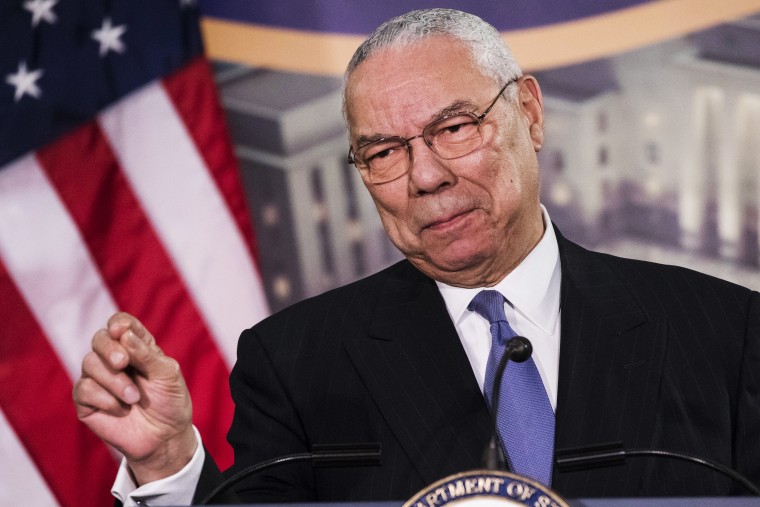During his military tenure, Colin Powell did not publicly identify as a member of a political party, but once he was a civilian, he announced his affiliation with the Republican Party. In fact, in 1996, Powell spoke at the Republican national convention, and four years later, he delivered the GOP's keynote address.
But his approach toward electoral politics soon changed. In 2004, Powell did not attend his party's convention, and in 2008, 2012, and 2016, Powell endorsed the Democratic presidential tickets, though he did not speak at any conventions.
Last night, Powell made his first major-party convention appearance in two decades, but it was at the other party's national gathering.
Former Secretary of State Colin Powell delivered a heartfelt endorsement of Joe Biden during day two of the Democratic National Convention on Tuesday, handing the former vice president another boost to his national security bona fides.
"Joe Biden will be a president we will all be proud to salute," the former chairman of the Joint Chiefs of Staff said in a video message. "With Joe Biden in the White House, you will never doubt that he will stand with our friends and stand up to our adversaries -- never the other way around."
In another not-so-subtle shot at Donald Trump, Powell added that Biden "will trust our diplomats and our intelligence community, not the flattery of dictators and despots. He will make it his job to know when anyone dares to threaten us. He will stand up to our adversaries with strength and experience."
A day earlier, those watching the convention saw former Ohio Gov. John Kasich (R), just four years removed from his own GOP presidential campaign, standing at a literal crossroads and voicing support for the Democratic nominee. "I'm a lifelong Republican, but that attachment holds second place to my responsibility to my country," Kasich said.
Viewers then saw a montage of Republicans also voicing their support for Biden. Among them were Christine Todd Whitman, another member of the Bush/Cheney cabinet, and former Rep. Susan Molinari (R-N.Y.), who delivered the keynote address at the Republican Party's 1996 national convention.
Every cycle, there are usually a partisan apostate or two -- Georgia's Zell Miller, for example, delivered an unfortunate speech at the GOP convention in 2004 -- but I'm not aware of national party gathering featuring quite so many voices from the other party as what we've seen this week at the Democratic convention.
And for some, especially on the left, this is not an encouraging development. There's a finite amount of time available in the spotlight, the argument goes, and it's a mistake to share that time with people who aren't even Democrats, and who disagree with the party on key issues.
But in an interview with NBC News yesterday, Democratic National Committee Chair Tom Perez made the opposite case. "At the end of the day, what I say respectfully to my friends who say he shouldn't be on the stage is that politics is about arithmetic," Perez argued. "Addition beats subtraction any day of the week."
Rep. Cedric Richmond (D-La.), a national co-chairs of Biden's campaign, made a similar pitch to reporters on Monday. "There are a bunch of people out there, silent Biden voters, Republicans who want to vote for Biden or who will be voting for Biden, and it's important to let them know they're not alone," the Louisiana congressman said. "There are Republican leaders that are voting for Biden [and Kamala] Harris. You make sure that support is known."
It's a persuasive case. I don't imagine there are millions of undecided voters who are carefully following the details of the parties' nominating conventions, but it's quite possible that many of these same voters -- many of whom don't usually vote Democratic -- will hear about the series of high-profile Republicans backing Biden, and it will have an impact.
In effect, the message to these voters is, "A whole lot of Republicans are putting party aside and backing Biden because the country's on a dangerous course under Trump." Will die-hard GOP partisans care? No. Will some voters who lean right but aren't happy with the status quo consider Biden after hearing a bunch of prominent Republicans endorse him? It's a distinct possibility -- and for the Democratic convention organizers, it's worth the modest time investment.

